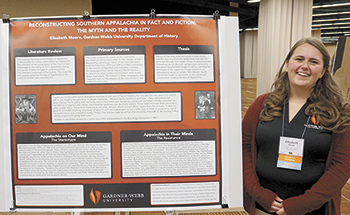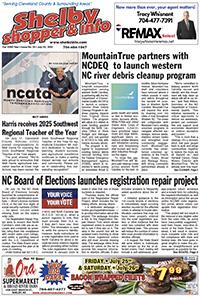 On a national stage in Chicago, Ill., while fighting pneumonia, Gardner-Webb senior history major Elisabeth Moore talked about hillbilly stereotypes. And she won a prestigious award in the process.
She was in high school when she first realized how much the stereotypes about Appalachia had permeated contemporary culture. Moore was born and raised in the western North Carolina mountains of Brevard. While in Chapel Hill, N.C., as part of the North Carolina All-State Honors Band. She remembers a girl asking her how she overcame the obstacles from growing up in Brevard.
"Brevard, N.C., is home to the Brevard Music Center which is world-renowned; it hosts professors from Julliard, and that kind of thing," Moore explained. "It was astounding to me that, in 2012, she thought that we only played the fiddle and the dulcimer and didn't know how to pick up a clarinet. But that's kind of what got me interested."
Fast forward to November of this year, when Moore found herself at the National Collegiate Honors Council Conference in Chicago, so sick she wasn't sure if she would be able to present to judges the findings of her extensive undergraduate research on the stereotypes of Appalachia.
"I honestly had to rely on the Lord to do it," she reflected. "My thesis deals with the accuracy of the Appalachian mountaineer stereotype, which is very much what you think of when you consider the Beverly Hillbillies: backwards, ignorant, illiterate, drunks who don't have much knowledge of society and aren't very civilized. Incest is a big part of this stereotype, as well as the idea that they have no community, that they're just kind of back in the back woods in the log cabin drinking moonshine and playing the banjo. I definitely enjoyed the opportunity to explore the prevalence of this stereotype today. I think this historical discussion is relevant."
As an undergraduate summer research scholar at GWU this year, she spent several weeks in library archives, perusing every mid- to late-19th century publication that related to her research topic.
"I kind of discovered that nobody had taken a look at this from a local perspective, so I looked at western North Carolina and whether the stereotype created by local colorists in the 1880s and 1890s was accurate," she offered. "I learned, for the most part, that Appalachians themselves resisted that stereotype. They very much saw themselves as part of the New South. In some respects, the stereotype does have foundation, but overall, it oversimplifies Appalachian life and Appalachian culture."
She continued. "Stereotypes are one-dimensional and the reality of life is never one-dimensional; it's always more complex. And so my thesis is actually more that Appalachian life is far more complex than the stereotype portrays."
After two hours of answering the judges' questions, Moore learned she had earned the "Best Presentation in Social Sciences" award at the conference. "It didn't really sink in until we got back, but I have honestly been most honored by the opportunity to represent my school and my subject in such a prominent way," she shared. "I was competing against other undergraduates from across the United States. I was a little fish in a really big competition in Chicago. It was nice to bring some recognition to our department that does so many things so well. It was also great to bring some awareness to the subject I cover."
She aimed her thesis at specific ways the stereotypes on Appalachia are incorrect. "There was this big stereotype that mountaineers were all Anglo-Saxon people, and actually there were African-Americans, there were Native-Americans, there were Chinese in Appalachia during the 1880s," she explained. "The stereotype affects all aspects of Appalachian society, so I had to look at lots of different things: religion, community institutions, socio-economics. The common view was that they were isolated. It turns out they weren't. They had a hog trade with Paris, France, in the 1870s, which is not isolated at all. I looked a lot at socio-economics. There was a very potent merchant class that participated in international trade with the low enders in South Carolina. They weren't all just poor white people struggling to survive."
Her achievements, she says, are a direct reflection of Gardner-Webb's excellent programs and professors who have helped develop her research skills.
"I couldn't have done the research I've been able to do without the professors who have helped me and mentored me along the way. Dr. Joseph Moore, Dr. Tom Jones, Dr. David Yelton, and Dr. Timothy Vanderburg all deserve credit for my successes," she reflected.
"I am the product of undergraduate education done right," Moore offered. "I'm not unbelievably brilliant. I'm the product of a brilliant institution that prizes original undergraduate research and a lot of hard work."
Submitted by Niki Bliss-Carroll |




